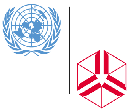
network of research and training centres and programmes
Issue 13: December 2001
 |
UNU Update | |
| The newsletter of United Nations
University and its network of research and training centres and programmes |
||
|
Issue 13: December 2001 |
||
| UNU/INWEH enters major agreement to help address Mid-East water crisis Projects to help address the twin problems of water poverty and pollution in the Middle East will be implemented under a major agreement between a billionaire philanthropist in Dubai and the U.N. University’s International Network on Water, Environment and Health (UNU/INWEH). Haj Saeed Bin Ahmed Al-Lootah will provide CDN$4.4 million to UNU/INWEH over two years to undertake projects to improve regional water management skills, conduct water-related research, and facilitate the development and transfer of helpful water technologies to the arid Middle-East. The projects will take place in Dubai, other Emirates of the United Arab Emirates, and possibly elsewhere in the region. The first two projects being considered will address coastal zone management in the UAE and the upgrading and certification of aquatic environmental laboratories in Dubai. A UNU/INWEH Project Center, including offices, administrative staff, communications and access to laboratory facilities will be donated through the World Al-Lootah University, which Mr. Al-Lootah founded in Dubai. Commitments have also been made for additional resources to expand the programme after successful initiation of the first projects. In an effort to help address severe problems affecting human health, water quality and levels of pollution, the projects will:
“We are delighted to initiate this new partnership and look forward to working with Mr. Al-Lootah and his namesake university to improve water management in a part of the world where needs are both large and urgent,” said UNU/INWEH Director Dr. Ralph Daley. “The global water crisis seriously hampers efforts to alleviate poverty worldwide and threatens future progress towards sustainable development,” he said. “Projects such as those to be undertaken under this agreement will help alleviate water shortages and water-borne diseases, which kill or seriously harm more people on a global basis than any other health problem.” According to the U.N.:
UNU/INWEH advocates the need for integrated capacity development as an essential prerequisite for integrated water resource management. With a small team at its headquarters in Hamilton, Canada, UNU/INWEH has used its networking approach to initiate and co-ordinate 23 projects involving 20 countries. Over 1,000 people have received water management training. Some 44 cooperation agreements with partner organizations have been signed or are pending in Canada and 12 other countries. |
|
Copyright © 2001 United Nations University. All rights reserved. |